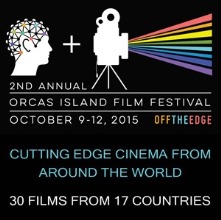— by Paula Treneer —
OIFF Film Review: “Taxi”, 2015 Golden Bear winner by banned director Panahi
Surprisingly humorous and kindhearted, “Taxi” is the third film made by Jafar Panahi, the acclaimed Iranian director whose 2010 ban from filmmaking and travel has been contravened three times since then by the dedicated auteur, who in this instance defies the Iranian authorities by mounting a camera on his taxi’s dashboard and proceeds to film an array of passengers while driving around Tehran.
The actors in this film are a series of unwitting passengers ranging across the spectrum of Iranian society, whose conversations with each other and with Panahi reveal a touching degree of humanity as well as providing a great deal of humor. Several of the passengers are either acquainted with Panahi or recognize him, but only one recognizes the dashboard camera and understands its purpose. Fortunately for us, and for him, presumably, she happens to be a civil rights activist and friend of his, whose candid utterances on the subject of government repression were startling, within the context of Western prejudices about contemporary Iran.
Since Panahi’s 2010 arrest and conviction to a six-year jail sentence, which he has not yet served, he has become a “cause celebre” in the world of cinema, whose earlier absence from a Cannes jury was marked by an empty chair. As a result of the global outcry, Panahi is able to make his films as long as he respects certain rules, according to a 2004 NPR interview, excerpts from which were recently re-broadcast on station KPLU (October 8, 2015). According to the interview, the Iranian authorities refuse to allow him to create realistic cinematic shots (i.e., he can’t film a husband and wife in their own home unless the wife is wearing the veil, which in actuality is only worn by women outside their homes).
As a result, he chooses to film in “the street”. His friend, Professor Akrami at William Paterson University, explained to the NPR host on the 2004 re-broadcast interview that taxis have become vehicles where people can speak freely about their daily lives, and this liberty of expression is exploited to provide an array of incidents and travelers which reveals a great about daily life in Tehran, from a scene where an injured man hysterically asks for his last will to be filmed by another passenger, to two middle aged/elderly women carrying goldfish to a nearby spring in pursuit of a superstitious belief that to fail in their quest before noon will be fatal, to the lengthy monologue delivered by his young niece enumerating the list of proscriptions imposed on her cinema assignment by her teacher. Not the least of which was included the proscription to avoid depicting “sordid realism”, an expression used to significant impact in the later scene with the human rights lawyer; an expression translated from the Farsi literal meaning of “to show black” (NPR .org).
This film does anything but depict “sordid realism”, it is a loving celebration of Iranian humanity and diversity, against a backdrop of a repressive society which fails to suppress the human spirit captured so well in Panahi’s own person.
**If you are reading theOrcasonian for free, thank your fellow islanders. If you would like to support theOrcasonian CLICK HERE to set your modestly-priced, voluntary subscription. Otherwise, no worries; we’re happy to share with you.**







